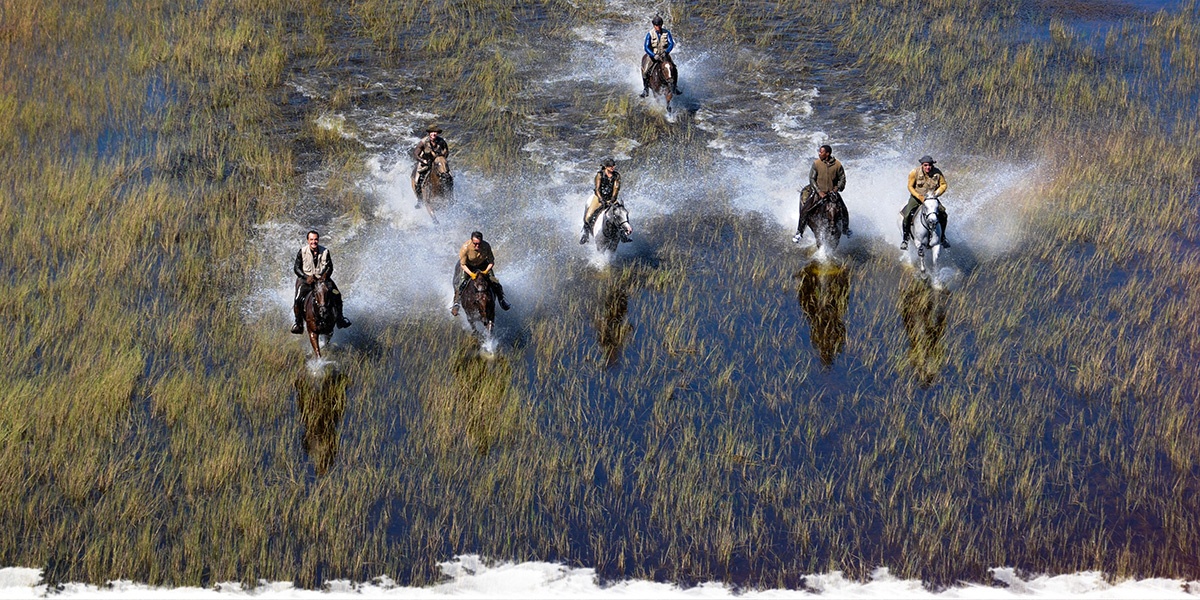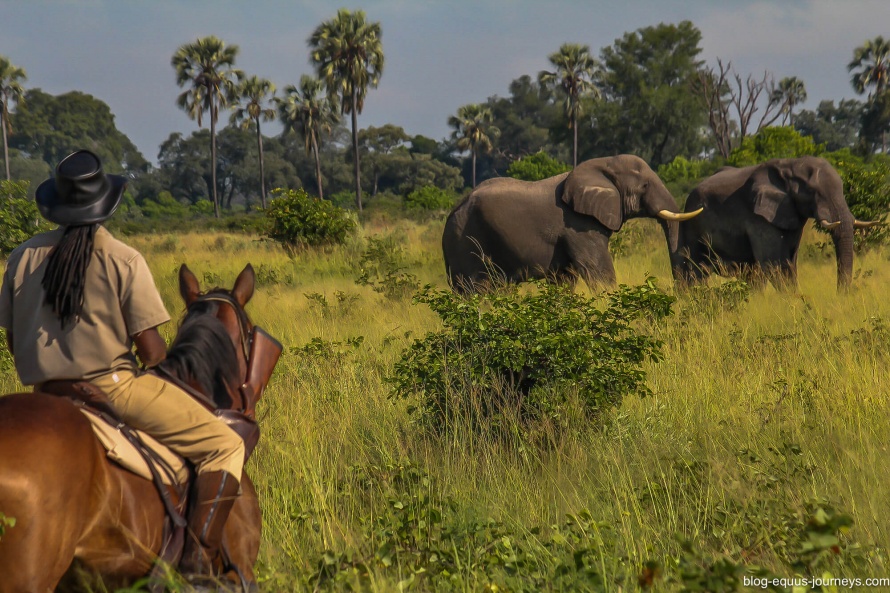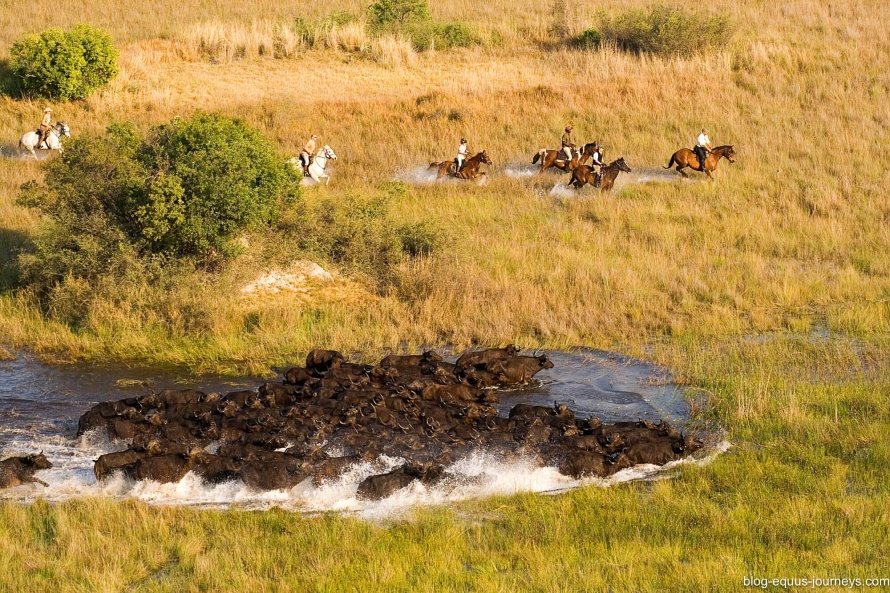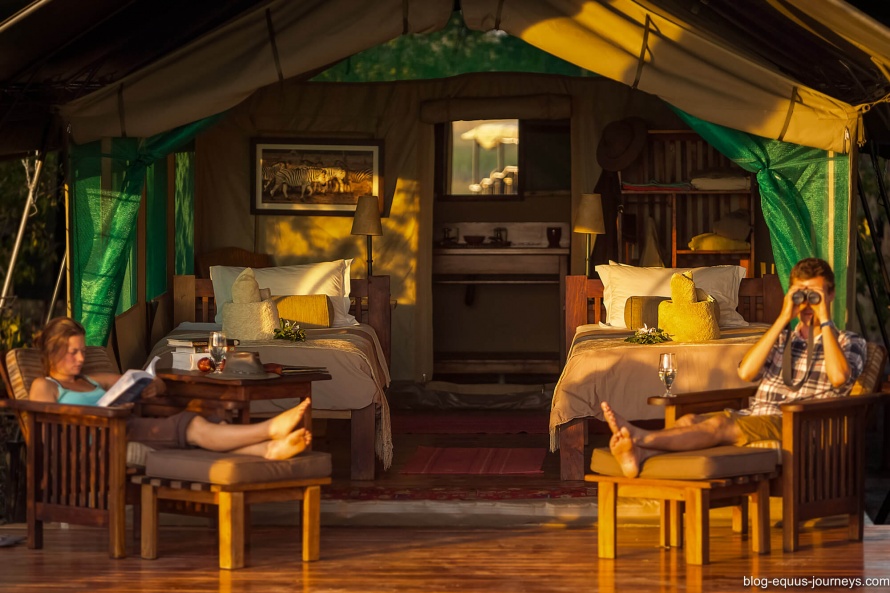
Choosing the right Okavango Delta safari in Botswana
A riding safari in the Okavango Delta is one of the ultimate horseback experiences and is on many a rider's bucket list. There are quite a few options available and many riders do not really know where to start! We hope that this little guide will help you understand how each of our horseback safaris in the Okavango is unique and special in its own way. Of course, if you are still not sure which is the right option for you, then best give us a call - our advisors are always happy to help. Chris, Louise & Iris from our team have explored the Delta on horseback, on foot, in jeeps and mokoros and will be pleased to share their experience with you.
The Okavango Delta, the pearl of Botswana
The Okavango Delta is one of the world’s largest inland Deltas and one
of Africa's prime wildlife watching location. This 15,000km2 wetland and
wildlife haven is located deep within
the Kalahari Desert: every year, usually come April/May, waters coming from
Angola in the north of Botswana flood into the Delta, swelling it to three
times its permanent size. The Delta is also a very flat area, with endless
expanses of land and nothing to block the horizon. Ideal for faster riding! The Delta was named one of the Seven Natural Wonders of Africa in 2013.
The following year, it officially became the 1000th site to be inscribed on the
UNESCO world heritage list. All of the Big Five (elephant, rhino, buffalo, lion
and leopard) are present in the Okavango Delta, and there are also plenty of
opportunities to see an abundance of plains game – but this is a vast area and you
never really know what you may see on a horseback safari.

Is
this for me?
Due to the presence of big game, riding safaris in the
Delta are reserved to experienced riders, who are comfortable at all paces and
able to handle a horse in open spaces. You should be secure in the saddle and
able to stay on if the unexpected happens or if you need to make a swift exit.
That being said, horses on these safaris are extremely well-trained: they are
used to the wildlife and quite sensible around the game. Our safaris in the
Okavango Delta are always accompanied by a qualified, experienced lead guide,
as well as a back-up guide for maximum safety. On most safaris, non-riders or inexperienced riders will be offered other
activities, such as game drives, walking or mokoro safaris, fishing, etc. So there
are no excuses not to bring your loved ones with you, even if they do not
ride! If you aren't a very strong rider yet but still want to experience the thrills
of a riding safari, or would like to bring younger children, please contact us
so we can discuss options for you.
When to go?
The Okavango Delta is a seasonal floodplain and so different times of
the year offer different experiences - each magical in its own way. Remember
that the seasons in southern Africa are the reverse of the UK! The water level
in the Delta depends on the rainfall in Angola and the floods usually arrive around
April/May and recede around September/October, but this varies every year and
is difficult to predict. June, July and August are always very popular months
but the Delta can be enjoyed pretty much all year-round, depending on the type
of riding you are after, and on how well you can cope with the heat... It does
get pretty hot and humid during the African summer (so, if you are following,
during our European winters!). The following guide may prove useful when planning the best time for
your holiday.
March/April: Daytime temperatures are warm/hot (25-35c) and will drop to
10-20c at night. There is a small chance of rain and the bush is green and
lush. There will be waterholes left over from the rainy season but the flood
may not have arrived yet. Because of the rain, lush grazing and plentiful
waterholes, the game is dispersed and not gathered in big herd but will look
fat and healthy.
May: Daytime temperatures are falling (20-30c) and it is starting to feel
cooler at night (5-10c). The floods normally arrive in May which brings high
levels of bird life. The large herds of lechwe antelope and buffalo will start
to move into the area, but game is still dispersed as there is plenty to eat
and drink.
June-August: Daytime temperatures are still pleasant (20-25c) but nights are
cold (3-5c) and so the early morning and late evenings are chilly. The floods
are at their highest and so there is plenty of wading from island to island and
boat activities. Hippo and crocodile may move into the area as well as large
buffalo and antelope herds. This is a great time to go if you like splashy
canters and if you do not cope very well with the heat!
September/October: The dry season starts to slide into the wet season. Spring
arrives and temperatures start to climb with daytime temperatures of 30-45c,
dropping to 15-25c at night. The floods are starting to recede, the islands are
dry as there has not been rain for months. As a result, the game starts to concentrate
around the water holes, and this provides interesting wildlife-watching
opportunities.
November - February: The rain can arrive anytime in November. Daytime
temperatures are high before the rains (30-40c) but drop after each shower. It
is unlikely to rain persistently, but usually for a few hours. Nights are still
warm (15-20c). The bush turns green after the rains and the grass starts to
grow again. Once the waterholes start to fill again the game will disperse. The
antelope will give birth during this time of plenty.

Horseback safaris in the Okavango
A small, exclusive permanent camp in the heart of the Okavango Delta. Macatoo is a luxury bush camp and a rider's paradise! The morning rides are
normally fast and exhilarating. You usually ride out at dawn when the game is
most active, with plenty of opportunities for long canters on the dry islands
or splashy gallops across the flood plains. When water levels are deep it may
also be possible to swim the horses across some channels. The afternoon rides
are usually shorter and more relaxed, allowing riders to get as close as
possible to the wildlife, with great photographic opportunities. The camp was renovated to very high standards in 2025 and offers luxurious, walk-in tents
on raised platforms. Each tent has its own en-suite shower and loo. There is no
WiFi and no electricity inside the tents, so be prepared to disconnect from the
outside world! Accompanying non-riders are welcome and are offered walking, boat or
vehicle safaris (dependent on water levels) and a 10% discount.
This horseback safari in the western region of the Delta comprises two camp options: Kujwana camp, the main permanent camp, and a snazzy fly camp (mobile camp). This camp has also been renovated in 2025. What makes this safari so
special is that you will experience all of these camps within your week: a
great way to explore a wider area and enjoy different environments. This is an
exciting choice if you like to ride a lot, generally at a fast pace, and get
close to the wildlife. Non-riders on this safari have their own guide and will be offered game
drives, powerboat/mokoro safaris, walking safaris and fishing. Guests move with
the riders to the various camps and join non-riding activities and picnics. We love that you can choose to fly into camp by helicopter - a 25-minute
scenic flight which is an incredible experience.
A fully immersive riding safari in the Okavango Delta, out of the beautiful Cha Cha Metsi camp on the Santantadibe River. This very recent camp (2023) is a new addition to the Delta and offers riding safaris all-year round, with the added bonus of being located on a permanent lagoon, allowing for excellent wildlife sightings all year round. Enjoy long splashy canters or relaxed safari rides, join a game drive or just relax at camp - Cha Cha Metsi has something for everyone.
This itinerant horseback safari in the Okavango Delta is perfect for you
if you are not necessarily seeking the luxury of the permanent camps, but
instead are interested in an eco-friendly and sustainable holiday with very
little impact on the environment. This safari focuses on the reality of the
Delta: the experience, the wildlife, and top-level guiding, often by bush guru
David Foot himself. David boasts a wealth of over 25 years of experience
guiding throughout Africa and is an amazing guide to ride with. The fully mobile camp is made of lightweight tents big enough to stand
in, stretcher beds, bucket showers and short drop loos. It may not be as
luxurious as some of the permanent camps in the Delta, but it is still quite a
step up from your usual camping situation! And of course, all meals are freshly
prepared each day by the camp cook. Your belongings are transported by mokoros when the Delta is flooded,
and by a flotilla of donkeys once the waters have receded. The team closely
rely on the locals and are highly respected members of the community.

And beyond...
Understandably, some of you will want to make the best of your time in
Africa and combine a riding safari in the Okavango with another ride or
extension.
If you want to extend your riding adventures, we can really easily
combine a Delta safari with other rides in Botswana or in Africa: why not add a few nights in the Kalahari desert to your Delta adventures? After an
adrenaline-filled holiday, relax in South Africa with a gourmet trail ride in
the Winelands... There are many possibilities and we will be happy to advise.
We can also look into non-riding extensions. Victoria Falls is a very
popular choice and the Delta is just a short charter flight from Kasane, where
we can organise a private transfer to the Falls. Mozambique is a fabulous
option if you are after pristine beaches and perhaps a spot of diving. Or maybe
a canoe safari along the Zambezi river is what you are looking for... It's all
up to you!
More information
For more information, please take a look at our riding safaris in Africa. You can also contact us directly at info@equus-journeys.com or call us on +44 (0)1905 388
977.
